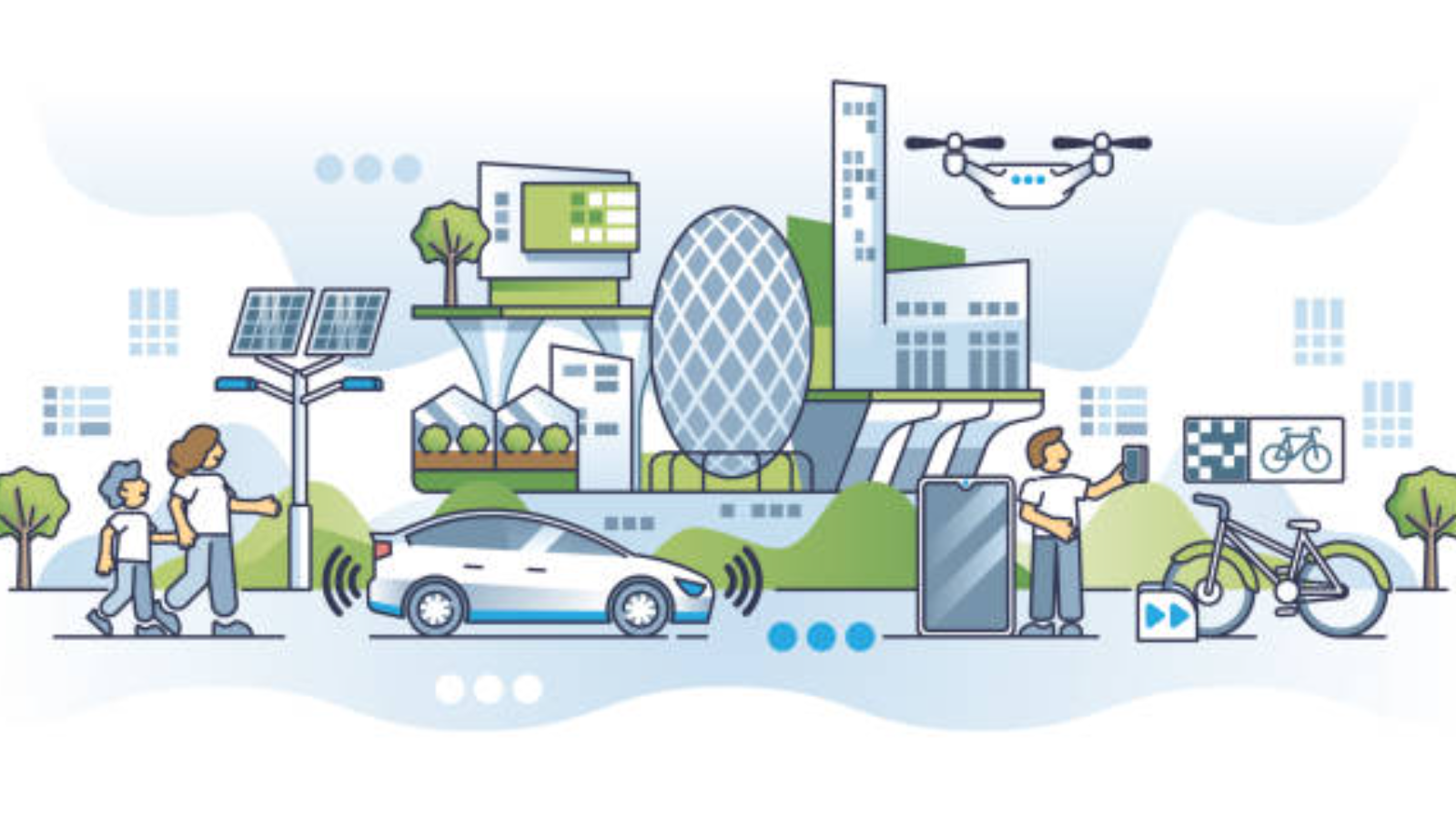In this Article
Introduction
In today’s rapidly evolving technological landscape, the concept of the “smart city” has emerged as a beacon of progress and innovation. Smart cities leverage cutting-edge technology to enhance the quality of urban life, optimize resource management, and promote sustainable development.
This article will explore the core initiatives driving smart cities, their benefits, and the future prospects of these urban innovations.
Smart City Initiatives
Smart city initiatives encompass a wide range of projects and technologies designed to improve urban life. Here are some of the key areas where smart cities are making a significant impact:
1. Intelligent Transportation Systems
One of the most prominent aspects of smart cities is the development of intelligent transportation systems. These systems aim to reduce traffic congestion, lower emissions, and improve overall mobility. Key components include:
- Smart Traffic Management: Utilizing sensors, cameras, and AI algorithms to monitor and manage traffic flow in real-time, reducing congestion and improving travel times.
- Public Transportation Enhancements: Implementing real-time tracking and dynamic scheduling for buses and trains, making public transit more reliable and convenient for commuters.
- Shared Mobility Solutions: Promoting the use of ride-sharing, bike-sharing, and electric scooters to reduce the number of private vehicles on the road and lower carbon emissions.
2. Energy Efficiency and Sustainability
Smart cities are committed to reducing their environmental footprint and promoting sustainable practices. Key initiatives in this area include:
- Smart Grids: Implementing advanced metering infrastructure and real-time monitoring to optimize energy distribution and reduce wastage.
- Renewable Energy Integration: Encouraging the adoption of solar, wind, and other renewable energy sources to power urban areas and reduce reliance on fossil fuels.
- Green Building Practices: Promoting the construction of energy-efficient buildings equipped with smart systems for lighting, heating, and cooling, reducing overall energy consumption.
3. Public Safety and Security
Ensuring the safety and security of residents is a top priority for smart cities. Innovative technologies are being deployed to enhance public safety, including:
- Surveillance and Monitoring: Using high-definition cameras and AI-powered analytics to monitor public spaces, detect suspicious activities, and respond to emergencies more effectively.
- Emergency Response Systems: Implementing smart emergency response systems that provide real-time information to first responders, improving their ability to handle crises and save lives.
- Cybersecurity Measures: Protecting critical infrastructure and data from cyber threats through advanced security protocols and continuous monitoring.
4. Healthcare and Well-being
Smart cities are also focused on improving the health and well-being of their residents. Key initiatives in this area include:
- Telemedicine and Remote Health Monitoring: Leveraging IoT devices and telehealth platforms to provide remote medical consultations and monitor patients’ health conditions in real-time.
- Smart Healthcare Facilities: Equipping hospitals and clinics with advanced technologies for patient management, diagnostics, and treatment, enhancing the overall quality of care.
- Health and Wellness Programs: Promoting healthy lifestyles through public awareness campaigns, fitness tracking apps, and community wellness initiatives.
Future Prospects of Smart Cities
Smart cities’ future promises revolutionizing urban life with advanced technology, enhancing interconnectivity, efficiency, and responsiveness to residents’ needs. Here are some key future prospects for smart cities:
1. Enhanced Connectivity
With 5G networks, smart cities will achieve unparalleled connectivity. This will enable faster data transmission, real-time communication between devices, and more reliable IoT applications. Enhanced connectivity will support the development of autonomous vehicles, smart infrastructure, and advanced public services.
2. Advanced AI and Machine Learning
Advanced AI and machine learning will revolutionize smart city operations, enabling predictive analytics for proactive issue resolution. These technologies optimize resource allocation, enhance public safety, and improve urban life quality.
3. Sustainable Urban Development
Smart cities will maintain a strong focus on sustainability by reducing carbon footprints and promoting green practices. This includes expanding renewable energy sources, implementing circular economy principles, and creating eco-friendly urban spaces. These efforts support global climate change mitigation and foster a healthier environment for future generations.
4. Citizen-Centric Services
The future of smart cities will prioritize citizen-centric improvements in quality of life. This includes personalized services, accessible amenities, and inclusive urban planning to meet diverse needs. Citizen engagement platforms will empower residents to participate in decision-making and community development.
Conclusion
The future of smart cities holds immense potential for transforming urban life. By embracing innovative technologies and data-driven solutions, smart cities can address the challenges of urbanization and create more sustainable, efficient, and livable environments. As these initiatives continue to evolve, they will play a crucial role in shaping the cities of tomorrow.
How Can We Help?
At AlphaX, we are committed to supporting the development and implementation of smart city initiatives. Our comprehensive ecosystem offers a range of solutions to address the challenges discussed in this article. From intelligent transportation systems to energy efficiency and public safety, our technologies are designed to enhance urban life and promote sustainable development.
If you would like to learn more about how AlphaX can help your city become smarter and more efficient, please visit our contact page.
References
Related Blog Posts
How Smart Cities Connect: Getting Started with Edge AI and IoT Technology
How to Get Started with Edge AI and IoT Technologies in Smart Cities: Overcoming Integration Challenges In recent years, the concept of smart cities has evolved from a futuristic Read More
5 Step Strategy: Ensuring Security and Privacy in 15-Minute Smart Cities
Introduction Ensuring security and privacy in 15-minute smart cities is a critical challenge as urban areas become increasingly connected through IoT and edge AI technologies. These cities aim to Read More
What is a smart city and the challenge of legacy systems
How to Get Started with Integrating Legacy Systems in Smart Cities Smart cities are transforming urban landscapes by leveraging technology to improve the quality of life for residents. However, Read More




